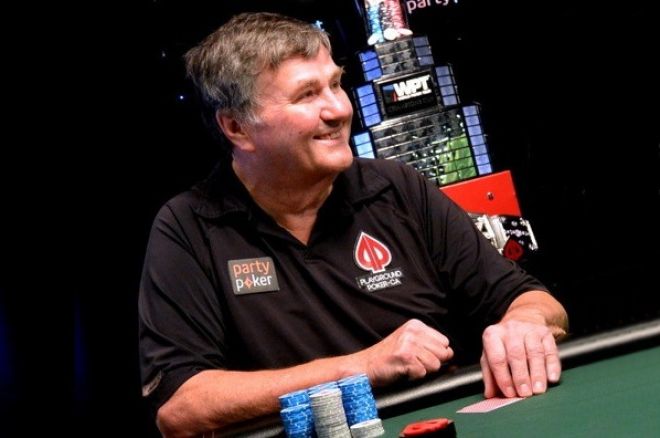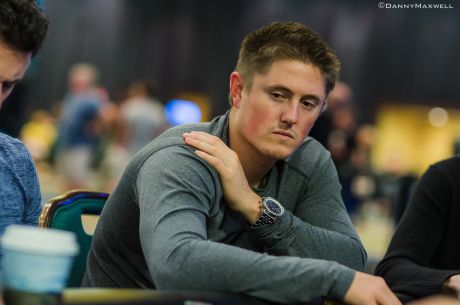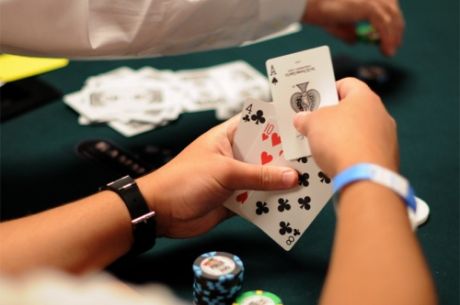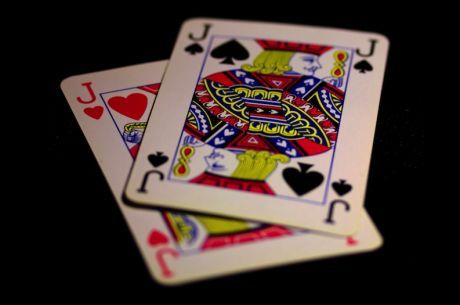Folding Kings on a Seven-High Flop: Anatomy of a Huge Laydown With Gary Lucci

Pale Death beats equally at the poor man��s gate and at the palaces of kings. ~Horace
As the Roman poet Horace so eloquently noted more than 2,000 years ago, even kings must contend with mortality. And as any poker player can attest, this ancient maxim holds true today.
The second-strongest hand in hold��em is routinely dethroned by the appearance of an ace on board, and every so often kings are cut down by two bullets in the hole. Nonetheless, it is a rare sight to see somebody fold pocket kings after an ace-free flop, which is why Gary Lucci��s laydown during the recent World Poker Tour Canadian Spring Championship was so remarkable.
After emerging from a field of 370 entrants to reach the unofficial final table, the Nova Scotia native had already locked up the largest score of his poker life, one that included 23 cashes for nearly $100,000 to that point. Just eight players remained in contention when Lucci looked down to find two black kings. As the WPT reported, what happened next left the entire table talking.
With the blinds at 15,000/30,000 with a 5,000-chip ante, Lucci sat with 1.71 million, putting him in the top half of the leaderboard with eight players left. Acting from under the gun, Lucci opened to 85,000, and it folded to Trevor Delaney in the hijack seat. Delaney flatted in position, but Levi Stevens opted to defend his big blind by three-betting to 225,000. Lucci and Delaney both called the reraise, and the flop fell 7?3?2?.
Stevens tapped the table, and despite a rainbow baby-card board, Lucci checked as well. Delaney then shoved for his last 1.2 million, forcing Stevens out of the hand before Lucci stunned his tablemates by turning his K?K? face-up and sliding the monster into the muck.
The typically no-nonsense WPT Live Updates team saw fit to include the following disclaimer in their recap of the hand: ��That��s not a typo �� Lucci folded pocket kings on a 7-3-2 rainbow board.�� Poker fans and media members alike immediately began tweeting about the curious laydown, with the following note by Kevin Mathers summing up the collective sense of disbelief:
Hand 18 at this @WPT @PlaygroundPoker final table can't be real - https://t.co/AZtrh41322
— Kevin Mathers (@Kevmath)
Simply put, nobody could quite understand why Lucci had passed up the spot. With just under 1.5 million at the time, Lucci might have vaulted into the chip lead �� while eliminating an opponent in the process �� by calling Delaney��s shove.
Lucci folded though, leaving the poker world wondering what really went down.
Rather than harp on whether or not Lucci��s play was ��correct,�� it can be useful to examine this hand as an example of how external factors can affect the game just as much �� if not more so �� than the action on the felt. In a vacuum, folding two kings on a seven-high rainbow board may seem like a blunder, but the game of poker is never played in a vacuum.
A player��s fluctuating bankroll demands can dictate his or her willingness to mix it up. Impending pay jumps can temporarily transform renegades into rocks. Prior history with an opponent can turn the traditional snap-call spot into a prolonged period of reflection. Even the setting and prestige of a particular tournament can prompt players, either consciously or subconsciously, to alter their approach.
And as Lucci explained to PokerNews one week removed from his laydown, all of these external factors and more conspired to encourage him to let go of the hand.
��The way he (Delaney) flat-called the first time, I don��t know why, but I had a feeling he had aces,�� Lucci said about his read on the situation. ��My instincts just told me he had aces. The way he didn��t reraise made me think he could be slow playing them like I was doing with my kings.��
Here, Lucci bases his analysis of the hand on the concept of a live read, or a tell based on an opponent��s physical behavior or betting pattern. If prior history led Lucci to believe that Delaney was prone to slow playing pocket aces, the latter��s choice to flat-call the initial raise and Stevens�� three-bet may have set off alarm bells.
��When he flat-called the 225,000, I just had a feeling,�� Lucci continued. ��I��ve played with him a lot [in] smaller tournaments around the area, and he��s a pretty solid player. He knows I have something when I call the 225,000, and he calls anyway, so I just had a feeling he had aces.��
Even if Lucci didn��t put Delaney on pocket rockets, he readily admits that another external factor likely would have led to the same laydown. Just two eliminations stood between Lucci and an appearance at his first WPT final table, a summit still sought by amateurs and pros alike. Sitting on 49 big blinds when Delaney made his move, Lucci looked around to see a few stacks shorter than his own, and he was content to let those players go broke before he played any big pots.
��My whole thing was to set different goals throughout the tournament,�� Lucci explained. ��One goal was to make the top 45... to make the money. Then, I was just trying to make it one step up every time the payouts increased. I just set goals as I went, so when we got down to the last 10 players, my goal was to make the official final table.��
��Now, the money means a lot to me, but it was more bragging rights than anything. I thought it was going to be televised and all that. I don��t think it��s going to be, but my goal at the time was to make the final six. And I thought he had more than me to be honest with you. I wasn��t a hundred percent sure, but I thought that put me out of the tournament if I called and lost.��
Most players will argue that Lucci��s laydown was simply too risk-averse, pointing out the fact that calling a shove with kings on a seven-high board would have essentially guaranteed him a seat at the final table �� if his hand turned out to be good. But this represents a micro-analysis, one concerned only with the conditions on the felt. Lucci, meanwhile, approached the hand more broadly, considering the personal importance he placed on playing his way to the official final table.
��Now when he goes all in, I��m thinking he��s got aces,�� Lucci remembered. ��But even if he��s just going for it with ace-king, ace-queen or whatever, the way I looked at it, if he��s bluffing with ace-high, I could still be beat if an ace hits. There��s still the turn and river to come....��
��Had I been at the final table, I probably call. But it was so important to me to make the final table, so I��m thinking even if he has ace-deuce, he could still beat me. I was playing it safe at that point, because the only goal left was making the final table.��
The phrase ��playing it safe�� could be interpreted as the motto of nits everywhere, and to be sure, a weak-tight strategy is usually less profitable than the alternative. In any case, Lucci clearly believed himself to be better served by contesting small pots rather than looking for one big splash.
��I��m not the type of player to call off my stack,�� Lucci said. ��I��d much rather play small pots and grind it out over one big shove. I hate pocket pairs like jacks, just hate ��em. Rather throw them away. Hands like three-four, five-six... those are my cards. My biggest two pots in the tournament were five-deuce and three-four (laughs). That��s just what I usually play.��
While the world will never know if Lucci��s laydown was ��correct,�� the play proved to be the right one for this particular player in this particular circumstance. Lucci watched one opponent go broke on the very next hand, and shortly afterward a second elimination secured him a seat at his first career WPT final table. Lucci went on to finish in fourth place for a $65,675 payday �� by far the biggest prize he��s ever won. When asked about his take on the hand given the benefit of hindsight, Lucci expressed little doubt about the legitimacy of his play, especially after Delaney told him and others that he did indeed hold pocket aces.
��He told me after that he had aces,�� Lucci said of Delaney. ��He said at the time that he flopped a set of threes, but he��d never have been in that pot with threes. It��s easy to say you have aces though. I��d say I believe him about 80 percent (laughs).��
��He doesn��t have much of a reason to lie at that point, and he told other people at the time that he had aces, so I think he did. Pascal [Lefrancois] also said he saw an ace as Delaney mucked, so there��s that. People couldn��t believe the fold though, and everybody at the table said they would��ve called. And they may have been right, who knows (laughs)? But I made it to the final table, and that��s all that matters.��
Get all the latest PokerNews updates on your social media outlets. Follow us on Twitter and find us on both Facebook and Google+!








